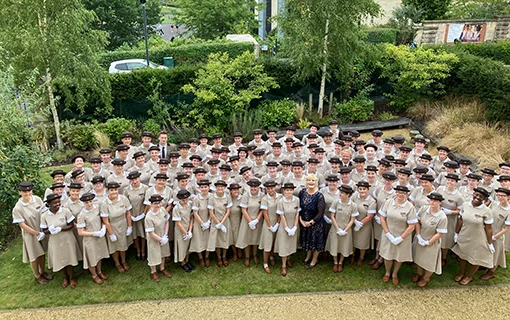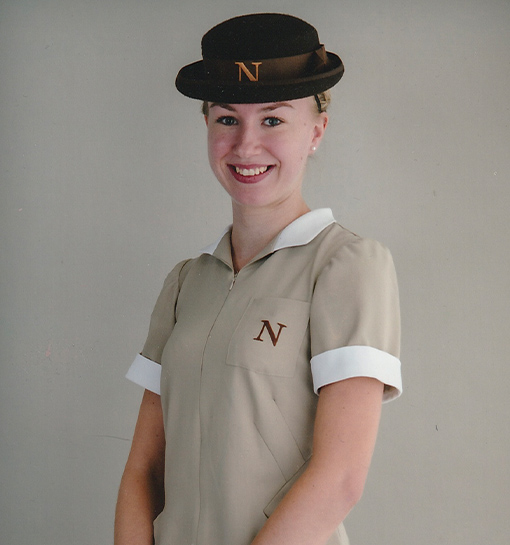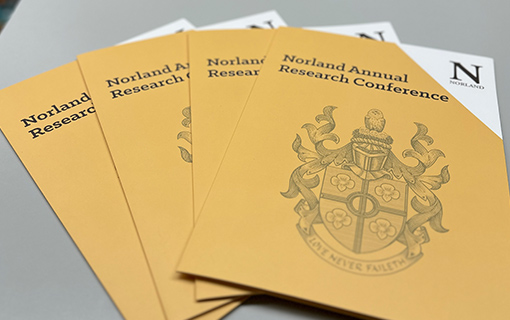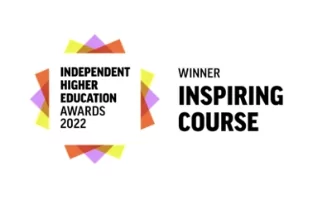Norlander reflects on emotion coaching CPD event
29 September 2021

One of the approaches Norland students learn during their training is emotion coaching. This is taught through modules such as Making Sense of Children’s Behaviour. Emotion coaching is an evidence-based approach that helps children to learn to empathise, self-calm and self-regulate, control their impulses, motivate themselves, and better cope with life’s ups and downs.
Principal Dr Janet Rose is co-founder of Emotion Coaching UK and recently led a continuous development course on the approach, which was attended by Stephanie (Set 30). In this blog, Stephanie discusses what she learned from the course, how she’s applying it to her practice and her exciting new work with children.
“I started at Norland in September 2006, when I was 18, as part of Set 30. I had no idea on that day what an exciting career I was about to embark on. I completed my college training in 2009 and took on my probationary job (now known as the Newly Qualified Nanny year) with a lovely family and their baby in London. Throughout my 13 years as a fully qualified Norland Nanny, I’ve worked in different roles around London and travelled the world. Every family was unique and offered a different experience, which constantly updated my knowledge and understanding of the early years. I’ve been in my current role for five years caring for a little girl who was 15-months-old when I started. Now she’s six and at school full-time, I work as a personal assistant during school hours.

“My whole perspective on supporting children and their families has significantly changed after attending this training.”
During lockdown, I heard about children struggling with their emotions as, for many, their lives had been turned upside down. Their parents and carers were also struggling with their own emotions and the knock-on effect of seeing their children struggle. I realised how little support there is for families to help them recognise the importance of emotions. I wanted to change this and make a difference in their mental and physical health. I was recommended Emotion Coaching UK, co-founded by Norland Principal Dr Janet Rose with Dr Louise Gilbert and Licette Gus. I signed up and, so far, have attended the two-day core training, held over a weekend, and the first follow up workshop. The training has taught me that emotion coaching is so much more than simply stating that a child is having a bad day because they feel sad.
Emotion coaching is a successful, evidence-based strategy based on renowned psychologist John Gottman’s parenting and relational research. It helps children to understand the different emotions they experience, why they occur, that we can’t help feeling them and how to handle them. A child can so easily be branded by their behaviour, such as being naughty or troublesome, but what emotion coaching has taught me is to look at what is causing the behaviour. Dr Janet Rose gave an example of an iceberg. Think of behaviour at the top of the iceberg but underneath the water there are all the different emotions that can trigger a certain behaviour. It highlights that behaviour is a communication of our emotions as the brain registers emotions felt in the body through the nervous system. This really made me sit back and think about how we expect children to feel happy all the time, but actually they need to feel all emotions so they can learn with the help of emotion coaching to self-regulate, improve and take ownership of their behaviour and control their impulses in all situations. Award-winning author and trainer Dr Mine Conkbayir states that self-regulation is the greatest gift we can give to children.
The Emotion Coaching UK session was eye-opening and fascinating, and I especially found learning about the brain very interesting. It clarified why we react the way we do when our emotions are running high. When a person is experiencing an emotional moment, they ‘flip their lids’ or in other words, the brain reacts and we ‘flip’ from our upstairs brain, which is our thinking brain, to our downstairs brain and go into a fight or flight type mode, or even a freeze type mode Emotion coaching encourages us to re-establish the connection between our thinking brain and our emotions so we can calm down and look at a situation rationally. Another aspect I found very interesting was learning about meta-emotion philosophy, which is basically emotion coaching ourselves and having greater awareness of ourselves, our emotions, how we react to others’ emotions and how we regulate our own emotions. Our meta-emotion philosophy influences how we react and respond to emotions in others, which is really important for helping parents and carers to support their children.
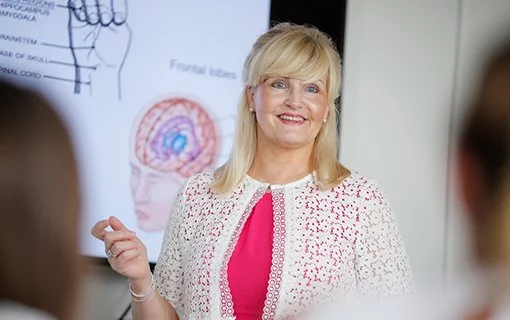
I learned an important lesson from the core training about different styles of dealing with emotions. I realised I have previously applied a dismissive style. This doesn’t mean I have not had good intentions to help the children and comfort them, but I’ve tried to push the emotions away or reduce them, thinking it would make it easier for them. An example would be trying to be positive and distract with “let’s have a cuddle and a snack” or “it’s fine, these things happen”. By doing this, I haven’t given them opportunities to self-regulate and to let them become aware, learn about and trust their feelings.
Moving forward, I will be applying emotion coaching to my role through four steps:
- Tuning in and empathising with the children in my care to calm them.
- Validating and labelling their feelings to let them know those emotions have been seen.
- If needed, setting a limit on the behaviour by setting the boundaries on acceptable behaviour while enabling them to keep their self-dignity.
- Problem solving with the child when they are calm to build alternative ideas and actions.
Applying these four steps in my practice will help children to learn to self-regulate rather than ‘flipping out’. By using this approach, I will be helping children and young people to develop emotional resilience, empathy and problem-solving skills. In other words, by co-regulating them to enable them to self-regulate.
I even use emotion coaching on myself. If something triggers my emotions and I go to my upstairs brain, I now stop and think: ‘what am I feeling’, ‘what is happening to me now’. Then I can start to think ‘where is this going to get me?’ or ‘what is this going to solve?’. I’ll talk myself through the emotion coaching steps, ensuring I calm myself first, so I can problem-solve much more efficiently. In stressful day-to-day life, triggers are going to happen to us all. By starting children with emotion coaching when they are young, they will develop the skills to prepare for those days and to deal with them effectively. This is why I recommend emotion coaching to nannies, carers and parents, especially as children develop their understanding about emotions through interpersonal relationships with key adults. It also helps them to feel more in control of their emotional experiences, while being more sensitive to their needs.
My whole perspective on supporting children and their families has significantly changed after attending this training. It’s something I feel very passionate about. I’m hoping to qualify as an emotion coach consultant and practitioner and I’ve set up my own Instagram page to help parents, nannies and child care providers.”
Follow Stephanie on Instagram